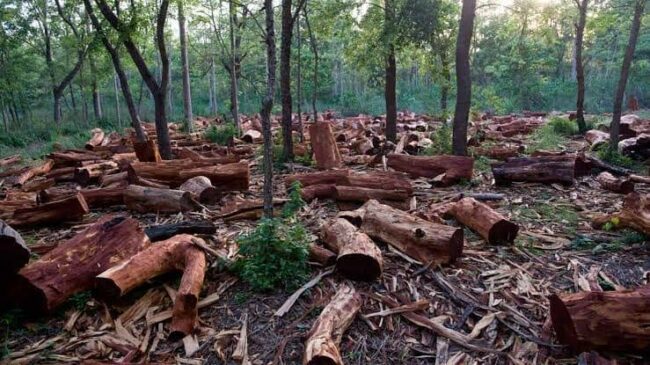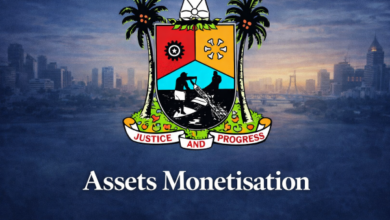Ekuri Rainforest Under Siege by Loggers

Lagos/Calabar — The Ekuri community of Cross River is raising the red flag: their community rainforest—33,600 hectares in 1992—now faces aggressive incursions from loggers, including foreign outfits. At a virtual unveiling of the 2025 “Roots of Resistance” report, Martins Egot, Chair of the Ekuri Initiative, described the impact as “devastating,” alleging weak oversight and a growing wave of youth mobilisation for illegal felling as outside actors profit.
Egot expressed concern on Wednesday at the virtual unveiling of the Global Witness 2025 Report titled; “Roots of Resistance’’.
The unveiling was convened by the Renevlyn Development Initiative (RDI).
He said that Ekuri, a combination of two communities identified as Old and New Ekuri, had 33,600 hectares of pristine forest in 1992, but was now under threat and in an appalling state.
“We now see international loggers come into Ekuri to exploit the resources that we have.’’
According to him, the Ekuri rainforest is being recklessly exploited and the government authorities that are supposed to check these activities are not checking it.
“Now the problem we have is being confronted by external forces who are interested in logging our resources’’, he said.
Egot said that communities that had lost forests to illegal activities were pressuring Ekuri and mobilising youths to engage in similar act of illegality.
He alleged that some illegal loggers armed, including foreign companies, were stirring unrest among Ekuri youths.
According to him, such acts trigger youths to feel cheated as outsiders profit from their forest resources amid local economic hardship.
What’s Happening in Ekuri
- Intensifying incursions: Community leaders report international loggers taking advantage of weak field enforcement, with allegations that some operators are arming proxies and stoking unrest among local youths.
- Policy whiplash: A government moratorium, intended to protect the forest, is reportedly distorting incentives—pushing harvesting underground and normalising illegality.
- Safety risks: Egot says forest defenders face threats and have no reliable recourse when attacks occur.
- Global backdrop: The Global Witness 2025 report counted 146 killings/disappearances of land and environmental defenders in 2024 (down from 196 in 2023). Africa recorded nine killings (DRC 4, Liberia 3, Cameroon 1, Madagascar 1), with authors warning that African incidents are under-reported.
“We’ve seen how powerful community-led conservation can be,” Egot argues. “Empower communities and they become the most effective guardians.”
Why It Matters…
Cross River’s rainforest, and the Ekuri rainforest specifically, isn’t just an ecological treasure; it is a trade, logistics, and investment issue:
- Illegal timber distorts markets: Unpriced externalities undercut compliant producers, dumping risk into Nigeria’s export reputation.
- Port & border choke points: Without traceability, ports and inland corridors risk becoming conduits for illicit timber, exposing shippers, bankers, and insurers to sanctions and compliance failures.
- Capital flight & lost local value: Raw log extraction exports value; sustainably certified processing (kiln-dry, veneers, furniture) keeps jobs and FX onshore.
- Climate finance at stake: Forest integrity underpins conservation and carbon-finance options. Degradation shrinks Nigeria’s climate and adaptation bargaining power.
Economics of the Canopy (What Nigeria Leaves on the Table)
- From logs to lifetime value: A single truck of illegal logs yields one-off cash. Community forestry + sustainable processing can yield recurring incomes (royalties, eco-tourism, payments for ecosystem services) while keeping the asset intact.
- Risk pricing: Multinationals and lenders increasingly price ESG and traceability risk. A tainted supply chain raises insurance premiums, demands enhanced due diligence, and can block access to export markets where deforestation due-diligence rules are tightening.
Governance Gaps Called Out by Stakeholders
- Field enforcement: Inconsistent patrols and low consequence for offenders.
- Moratorium design: Blanket bans without community livelihood alternatives push activity into the shadows.
- Fragmented mandates: Overlaps between state forestry, security agencies, and local councils dilute accountability.
- Data poverty: Few geo-referenced harvest permissions; weak integration with port documentation.
What “Good” Looks Like (12–18 Month Fixes)
1) Community-Concession Model (Legitimise the Guardians)
- Grant time-bound community concessions with harvest ceilings, replanting obligations, and community revenue-sharing.
- Fund community ranger units with legal backing; integrate their reports into state enforcement dashboards.
2) Traceability from Stump to Ship
- QR/geo-tag every legal stump; match to haulage manifests, mill receipts, and port export files.
- Require banks and insurers to verify traceability tokens before financing shipments.
3) Smart Moratoriums, Not Blind Bans
- Replace blanket bans with zoned protection + regulated production blocks; create alternative income lines (NTFPs, cocoa/ogbono agroforestry, eco-tourism jobs).
4) Port-State Controls & Penalties
- Empower NPA/Customs and port police to seize non-traceable timber; publish quarterly enforcement bulletins to change behaviour industry-wide.
5) Conservation Finance
- Pilot results-based payments for verified community protection (satellite monitoring + independent audits).
- Blend micro-grants for seedlings and youth patrol stipends with market access for certified wood and non-timber products.
By the Numbers (Ekuri & Defenders)
- Ekuri forest area: 33,600 ha (1992 baseline; now under acute pressure)
- Global defenders (2024): 146 killings/disappearances (down from 196 in 2023)
- Africa 2024: 9 killings (DRC 4, Liberia 3, Cameroon 1, Madagascar 1)
- Community sentiment: Rising youth pressure to join illegal logging amid hardship and outsider profit-taking
What Business Should Do Now
- Procurement pledge: No purchase of uncertified Cross River timber without geo-tagged chain-of-custody.
- Banking covenants: Lenders should demand traceability evidence before disbursing to timber clients.
- Insurance clauses: Embed illegality exclusions and require ESG attestations for cargo cover.
- Retail stance: Builders’ merchants and furniture brands to publicly list approved sources and cut off opaque supply.
BRANDECONOMY Take
Nigeria can’t treat forests as cash-and-carry without burning its trade credibility. The fastest, fairest fix is to put communities in charge, wire the chain with traceability, and tilt finance toward legal, sustainable value-add. Done right, Ekuri becomes a case study in community-led conservation—and a blueprint for keeping both biodiversity and business alive.
Bottom line: Protect the canopy, unlock the economy. When enforcement meets incentives, Cross River’s rainforest including the Ekuri rainforest can pay Nigerians—without being stripped bare.












